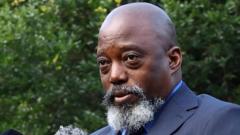The Democratic Republic of Congo's Senate has voted overwhelmingly to strip former President Joseph Kabila of his legal immunity, allowing for the prosecution of treason and alleged war crimes related to his connections with the M23 armed group.
Kabila Stripped of Immunity as DR Congo Moves to Prosecute Ex-President for Treason

Kabila Stripped of Immunity as DR Congo Moves to Prosecute Ex-President for Treason
Senate vote opens the door for legal action against Joseph Kabila amid accusations of rebel support.
The Democratic Republic of Congo (DRC) is set to prosecute former President Joseph Kabila following a Senate vote that stripped him of his immunity. The decision comes amid serious allegations claiming Kabila supported rebels in the eastern region of the country, which has seen ongoing conflict.
On Thursday, over 80 senators voted in favor of lifting Kabila's immunity, empowering military prosecutors to pursue allegations of treason against him, linked to the M23 group, which poses significant control over strategic towns in an area rich in minerals. Kabila, who denied past connections with these insurgents, has maintained silence regarding the recent accusations.
As a former leader from 2001 to 2019, Kabila received a "senator for life" title, which typically shields him from legal action, but the military prosecutor argued that the charges warranted a legal process. Recently living in South Africa, Kabila previously declared intentions to return to the DRC to aid in resolving ongoing conflicts, though there were conflicting accounts about his actual presence in the region.
In a controversial move, the DRC's authorities also ordered the seizure of Kabila's assets, with Justice Minister Mutamba insisting on his return to "face justice." Political analysts caution that the potential trial could exacerbate the nation's instability, which has been grappling with the M23 rebellion since 2012. Kabila's political party denounced the prosecution as a strategic distraction from more pressing national issues, as the DRC continues to navigate its tumultuous political landscape.
The situation remains fluid as Kabila's legal battles unfold, and the implications for the DRC are far-reaching, with many observing the broader context of ongoing violence and conflict in the country.
On Thursday, over 80 senators voted in favor of lifting Kabila's immunity, empowering military prosecutors to pursue allegations of treason against him, linked to the M23 group, which poses significant control over strategic towns in an area rich in minerals. Kabila, who denied past connections with these insurgents, has maintained silence regarding the recent accusations.
As a former leader from 2001 to 2019, Kabila received a "senator for life" title, which typically shields him from legal action, but the military prosecutor argued that the charges warranted a legal process. Recently living in South Africa, Kabila previously declared intentions to return to the DRC to aid in resolving ongoing conflicts, though there were conflicting accounts about his actual presence in the region.
In a controversial move, the DRC's authorities also ordered the seizure of Kabila's assets, with Justice Minister Mutamba insisting on his return to "face justice." Political analysts caution that the potential trial could exacerbate the nation's instability, which has been grappling with the M23 rebellion since 2012. Kabila's political party denounced the prosecution as a strategic distraction from more pressing national issues, as the DRC continues to navigate its tumultuous political landscape.
The situation remains fluid as Kabila's legal battles unfold, and the implications for the DRC are far-reaching, with many observing the broader context of ongoing violence and conflict in the country.





















